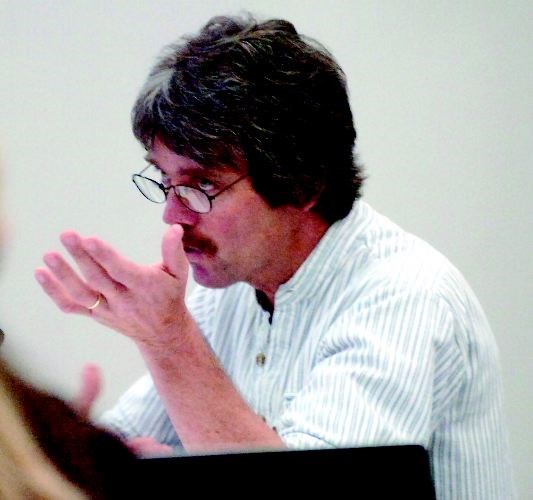Murray Minchin spent thousands of hours going over the Northern Gateway proposal, educating himself on the issues and preparing his questions for expert witnesses put on the stand by pipeline proponent Enbridge.
After asking questions ranging from earthquake risk to sludge build up in the pipeline for over three hours, the postal worker from Kitimat said he enjoyed himself.
"I'd say it was fun, oddly," Minchin said Wednesday at the National Energy Board's Joint Review Panel hearings into the proposed $6 billion plan. "It did help Douglas Channel Watch make a stronger final argument, which is what this was all about it."
Minchin and his Douglas Channel Watch group are worried about the effects the pipeline and marine terminal could have on the coastal environment. As registered interveners, they presented their own evidence and have the chance to ask Enbridge representatives questions. They will also be able to make a presentation at the final arguments next spring.
Rather than trying to get a handle on the entire Northern Gateway project, Minchin educated himself on specific areas and learned all he could about those aspects of the plan. He would get up at 6 a.m. before the rest of his family and over his morning coffee he'd dig into the material almost every day for close to three years.
"There's enough information in the proposal and on the web," he said. "Google changes everything. I could do a search one day and find a brand new peer-reviewed scientific report."
Although he found much of the research fulfilling and enlightening, Minchin said it also required some sacrifices.
"The deadline for our written submissions was Dec. 22, so you're ramping up for Christmas and I've got the headphones on and I'm buried into the computer for like 12 hours a day," he said.
Given the time commitment to attend all the hearings in Prince George - and Douglas Channel Watch intends to question all three Enbridge witness panels - Minchin had to take significant time off work to take part in the process, some of it unpaid.
Minchin spent much of his time questioning the witness panel on the reliability of seismographic evidence in the region. He pointed to a number of small earthquakes around the pipeline route and suggested that it's a possible threat to pipeline safety.
Drummond Cavers, a consulting engineer for Northern Gateway, said the company has seen no evidence that the small earthquakes, generally under three on the Richter Scale, will lead to larger ones and said it would take a major earthquake to damage the pipe.
"I guess it's certainly true we don't know everything about everything, but it's not fair to say there's a bogeyman in every closet," Cavers said.
The biggest success of his questioning, according to Minchin, revolved around the avalanche risk surrounding one of the tunnels Northern Gateway plans to build in the Coast mountains.
"Where they admitted that the tunnel portal slope can be subject to avalanche, that's huge," he said. "There's going to be an aerial crossing at the base of that slope and if that was an admission on their part that whole slope can periodically be swept by avalanches, then in my mind that's a deal breaker."
Near the end of Minchin's questioning, he asked about the possibility corrosion could weaken the pipeline, especially if Enbridge had to shutdown the network for some reason. That line of questioning was picked up by Prince George engineer Chris Peter who had the floor for the final hour of Wednesday's hearings.
Enbridge consultant James Mihell said regular maintenance and inspections are among the ways Enbridge plans to mitigate the corrosion concerns.
"This is not one of those situations that you build it and then walk away," he said.



